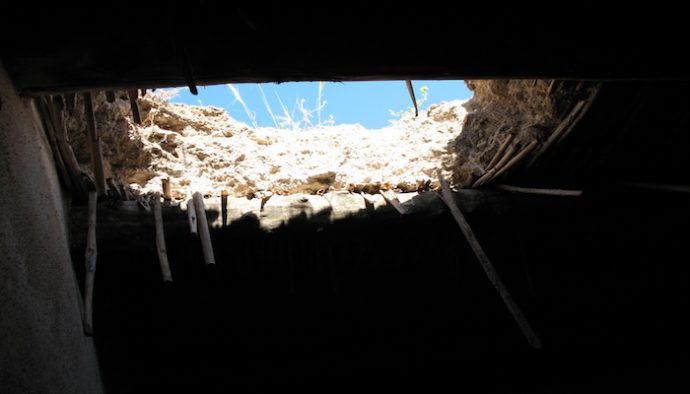The scene is a familiar one during the days of Jesus’ ministry in Palestine. Having developed the reputation as a teacher with authority, a friend to those on the outskirts of society, and a worker of signs and wonders, the crowds were thick around the Son of God. People pressing in from every side. Everyone clamoring for their own place in the crowd – a place to listen. A place to see. A place to experience.
And for more than one, a place where they might experience the miraculous. Surely, because of the crowds, more than one person with an ailment didn’t find such a place. Instead, they found themselves on the outskirts again, barely within earshot of the rabbi and yet not close enough to experience His healing touch. But Mark 2 gives us a different account.
Same crowds. Same desires. Same needs. But the mark of distinction in this case was a very determined group of friends:
When he entered Capernaum again after some days, it was reported that he was at home. So many people gathered together that there was no more room, not even in the doorway, and he was speaking the word to them. They came to him bringing a paralytic, carried by four of them. Since they were not able to bring him to Jesus because of the crowd, they removed the roof above him, and after digging through it, they lowered the mat on which the paralytic was lying. Seeing their faith, Jesus told the paralytic, “Son, your sins are forgiven” (Mark 2:1-5).
These friends were not to be denied. In my imagination, the come struggling under the weight of their friend only to find their way road-blocked by the teeming crowd. They look at each other with the hint of defeat in their eyes, then one by one they steel their resolve until one of them says, “If we can’t go through, we’ll go up.”
And so they do. They go to the roof and dig their way through it, no doubt causing a scene in the room as they lower their friend before Jesus.
If you read the rest of the account, you’ll find that Jesus pronouncement of forgiveness caused a stir among the religious leaders who had gotten their seats early. Then Jesus, in order to show His power and authority to do what He had already done in forgiving the man’s sins, healed His body. And the man who had been lowered through the roof stood up, grabbed his mat, and walked away.
Lots of remarkable things here. It’s a remarkable level of resolve from true friends to do what had to be done to get their friend to Jesus. It’s a remarkable level of faith to believe that if they just got him there then Jesus could make a difference. It’s a remarkable level of power from Jesus to heal this man, not just physically, but spiritually as well.
But in this list of remarkable details, there is one detail that is notably missing, at least to me:
What about the roof?
See, we know a little bit about the crowd. We know some about the religious leaders. We are introduced to the friends and get slightly acquainted with the paralytic. But we don’t know anything about the person whose roof was just destroyed. And I have to wonder how that guy felt.
After all, he was the one who opened up his home for this. He was the one show showed hospitality even though he didn’t know quite what to expect. He was the one who tried to accommodate the crowds though they were larger than he anticipated. And now here he was – the one holding the bag for a new roof. If I’m honest with myself, and if I were this man, I wonder if there would be at least part of me wondering when the right moment was to discuss the bill for the roof with Jesus.
Yet the Bible doesn’t give this homeowner a mention. And why not?
Who knows. Maybe it’s simply because it’s an inconsequential detail in the story and in the period of time the event happened. Roofs back then were made of clay-mud (hence digging) and wood, easily replaceable by half the people living in a town. A roof nowadays is much more complicated, you would have to call in the likes of roofing contractors Winston Salem to fix a person-sized hole.
Or perhaps it is inconsequential in a different way, because the soul is more important than the roof.
Yes, it’s true. And it’s a good word for all those “homeowners” like me who find themselves wrapped up in the details of personal cost. Of inconvenience. Of difficulty. Of all the “roofs” in my life that might get destroyed if I truly made a place for Jesus to do His work.
It’s a good word for all of us who get preoccupied by:
- The personal time it will take to invest in another person to disciple them.
- The way our living room will get damaged if we host a community group.
- The awkwardness that might happen if I have a real spiritual conversation with another dad from the school.
So many roofs. But so many souls. May it be, Lord, that we all are swept so deeply into the good work of the kingdom that these roofs in our lives no longer mean so much in comparison to the work of Jesus in which we might participate.
Subscribe to MichaelKelley.co
Never miss a new post. Subscribe to receive these posts in your inbox and to receive information about new discipleship resources.






1 Comment